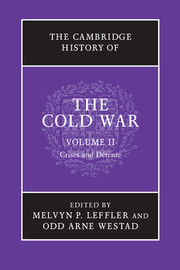Book contents
- Frontmatter
- 1 Grand strategies in the Cold War
- 2 Identity and the Cold War
- 3 Economic aspects of the Cold War, 1962–1975
- 4 The Cuban missile crisis
- 5 Nuclear competition in an era of stalemate, 1963–1975
- 6 US foreign policy from Kennedy to Johnson
- 7 Soviet foreign policy, 1962–1975
- 8 France, “Gaullism,” and the Cold War
- 9 European integration and the Cold War
- 10 Détente in Europe, 1962–1975
- 11 Eastern Europe: Stalinism to Solidarity
- 12 The Cold War and the transformation of the Mediterranean, 1960–1975
- 13 The Cold War in the Third World, 1963–1975
- 14 The Indochina wars and the Cold War, 1945–1975
- 15 The Cold War in the Middle East: Suez crisis to Camp David Accords
- 16 Cuba and the Cold War, 1959–1980
- 17 The Sino-Soviet split
- 18 Détente in the Nixon–Ford years, 1969–1976
- 19 Nuclear proliferation and non-proliferation during the Cold War
- 20 Intelligence in the Cold War
- 21 Reading, viewing, and tuning in to the Cold War
- 22 Counter-cultures: the rebellions against the Cold War order, 1965–1975
- 23 The structure of great power politics, 1963–1975
- 24 The Cold War and the social and economic history of the twentieth century
- Bibliographical essay
- Index
- References
24 - The Cold War and the social and economic history of the twentieth century
Published online by Cambridge University Press: 28 September 2010
- Frontmatter
- 1 Grand strategies in the Cold War
- 2 Identity and the Cold War
- 3 Economic aspects of the Cold War, 1962–1975
- 4 The Cuban missile crisis
- 5 Nuclear competition in an era of stalemate, 1963–1975
- 6 US foreign policy from Kennedy to Johnson
- 7 Soviet foreign policy, 1962–1975
- 8 France, “Gaullism,” and the Cold War
- 9 European integration and the Cold War
- 10 Détente in Europe, 1962–1975
- 11 Eastern Europe: Stalinism to Solidarity
- 12 The Cold War and the transformation of the Mediterranean, 1960–1975
- 13 The Cold War in the Third World, 1963–1975
- 14 The Indochina wars and the Cold War, 1945–1975
- 15 The Cold War in the Middle East: Suez crisis to Camp David Accords
- 16 Cuba and the Cold War, 1959–1980
- 17 The Sino-Soviet split
- 18 Détente in the Nixon–Ford years, 1969–1976
- 19 Nuclear proliferation and non-proliferation during the Cold War
- 20 Intelligence in the Cold War
- 21 Reading, viewing, and tuning in to the Cold War
- 22 Counter-cultures: the rebellions against the Cold War order, 1965–1975
- 23 The structure of great power politics, 1963–1975
- 24 The Cold War and the social and economic history of the twentieth century
- Bibliographical essay
- Index
- References
Summary
The Cold War was not only about power politics, security, and hegemony – it was also a conflict between differing theories of how to organize economies and societies at the various stages of industrial development. Ideologies and belief systems helped define the Cold War’s front lines, but social conflict also largely determined its course and outcome. Beginning with the Marxist challenge to the capitalist system, multiple social concepts emerged during the course of the Cold War without any clear favorite model emerging. In the long run, however, collectivist and centrally planned economies showed some strengths in modernizing less developed societies albeit at great costs, whereas free-market economies showed greater productivity, at least after having accepted state-run systems of social welfare and a certain degree of planning at the national and international levels. That political freedom favored productivity and innovation ought to be one of the major lessons of the twentieth century.
Capitalist system, Marxist movement, and Soviet power
For Karl Marx and Friedrich Engels, history was a story of class struggle. From their nineteenth-century perspective, they saw only two classes exercising an influence on history: the bourgeoisie that dominated society, and the proletariat that was exploited by it. The future, Marx and Engels believed, belonged to the proletariat. They predicted that the concentration of capital would continually increase, as would the exploitation and impoverishment of the proletariat. Finally, there would come a point when there would be no one left who could afford to buy the products of the few remaining big capitalists, and when the ever-expanding working class could no longer contain its indignation.
- Type
- Chapter
- Information
- The Cambridge History of the Cold War , pp. 503 - 524Publisher: Cambridge University PressPrint publication year: 2010
References
- 3
- Cited by



